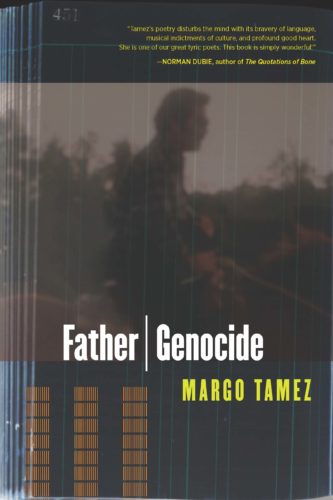Father | Genocide
Margo TamezOn the night before he “walked on,” Margo Tamez’s father recorded two questions onto a cassette tape: Where did all the good men go? Where did they go? Two decades later, Tamez reconstructs her father’s struggle to be a man under American domination, tracing the settler erasure, denial, and genocide that he and preceding generations experienced. She reclaims stolen territory in the felt and known history of colonial Texas through Ndé Dene [Lipan Apache] place, memory, and poetics of resistance.
“I was raised up in American violence,” Tamez writes, “and I have to explore all of its possibilities.” Her poetry brings out those possibilities by “timebending,” with a poetic form Tamez calls Indigenous fusionism-Indigenous futurism, a union of pastpresent, bodyknowing, intertext, bent tradition, landguage, and familial blood-knowing.
Father Genocide reveals why impunity on the Texas border is the key to understanding American identity violence. Her lightning poetry strikes the nested seeds and unburies the truth of these bitter lands.
- "A necessary, urgent, and affecting work." —Publishers Weekly
- "Tamez's poetry disturbs the mind with its bravery of language, musical indictments of culture, and profound good heart. She is one of our great lyric poets. This book is simply wonderful! —Norman Dubie, author of The Quotations of Bone
- "Father Genocide is a chef-d'oeuvre that transcends time, borders, space, and individual personality to exalt the resilience and strength of Tamez's people, the Dene Ndé (Lipan Apache)." —Darrel McLeod
- "Margo Tamez's poems are a witness to legacies of colonial violence and family resilience. They protest. They name names. They demand to be heard and they imply action. Father Genocide is a bold book, holding every one of us accountable for a world order we maintain." —Michael V. Smith
- "Tamez's Father Genocide offers us an insight into paternal remembrance and identity. The dissection of identity and blending Apache language repurposes the historical memory or benchmarks the archival burden of breaking down barriers, walls, and fences." —Crisosto Apache

